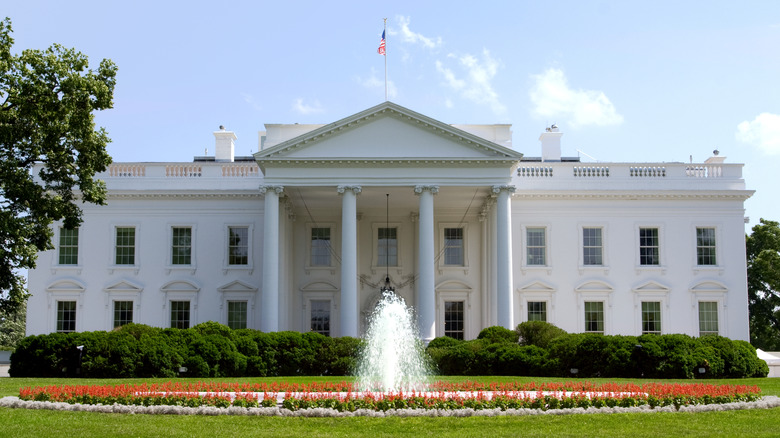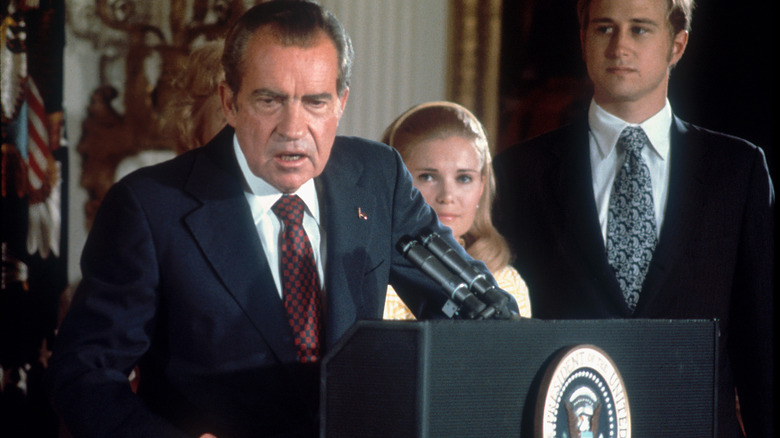This Was The First American President To Resign
Resignations happen all the time in nearly every field of work. Sometimes it's because someone is on their way out to another job; other times it's because someone has met the final straw of grounds for termination and they have no choice but to resign.
Resigning can be a big deal, depending on what industry you work in, and it's nothing short of extremely newsworthy when it's political. Governors, congressional members, senators, cabinet officials, and Supreme Court judges all make the news when they decide to resign. And it's not uncommon that a scandal might also precede that event.
Naturally this doesn't exclude even the highest office of the land. Presidential resignations are extremely rare, and that's because there's only been one. As it happened, one of the greatest political scandals in American history took place during President Nixon's time in office, per Britannica. The result ended in the first (and so far, only) recorded presidential resignation in America.
President Nixon was well into his second term as the 37th president of the U.S. in late 1974. But it all came crashing down in a momentous scandal that rocked Washington D.C. and the entire country.
First came scandal, then came resignation
What preceded this infamous step-down is what is commonly referred to as the Watergate scandal. In June of 1972, just five months before Nixon won his historic landslide re-election (per History), five men were caught breaking into rooms in the Watergate Hotel — a luxury hotel in the nation's capital (pictured). It was also the then-location of Democratic National Committee's headquarters.
What happened that night would bring down Nixon in the worst way. At first it just seemed like a standard burglary. The shock came when the petty crime led investigators to the president of the United States. This was the burglars' second trip to the location. They returned there to tap the phones (after previous failure) and to steal important paperwork (via another History link). But most importantly, they weren't just ordinary men; these bandits were specifically employed by Nixon's re-election campaign. Facing some uncertainty in his reelection, Nixon's campaign team took on some audacious strategies to ensure he won his second term, which he did.
But what's done in the dark eventually comes to light. A security guard working that night noted something amiss when he noticed some of the locks in the hotel had tape on them. He immediately called police and the men were caught and arrested. Though some early indications pointed to Nixon, not enough was out yet to connect his involvement. So he was reelected in November of 1972.
The only president so far to resign from office
However, a year in, the scandal was unfolding. In 1973, a full-fledged federal investigation was already going on, and two Washington Post reporters, Bob Woodward and Carl Bernstein, had top-secret intel about the scandal and blew the lid off, says History. Ultimately, people involved slowly started to crack. And then there were the Nixon tapes — recordings resulting from the president bugging his own office. It wasn't just a rogue campaign effort — Nixon knew all along about the break-in and was working to cover-up his involvement in the Watergate scandal. Knowing it was incriminating evidence, he even tried to withhold handing all of the tapes over. This led to the Supreme Court getting involved. At the same time, more information was coming out and things only worsened for Nixon, who was now facing impeachment.
By 1974, his public and political perception was tainted by the scandal. On August 8 he announced his resignation (pictured), becoming the first American president to resign (via History). In 1973, the same year the scandal was embroiling, his vice president, Spiro Agnew, had to resign, too (via The New York Times). Despite winning the election together, what seemed like a promising second Nixon administration concluded with both its vice president and president resigning a year apart before the term could be over. The day after he stepped down, Nixon was succeeded by Agnew's replacement, Gerald Ford (via CBS News).


